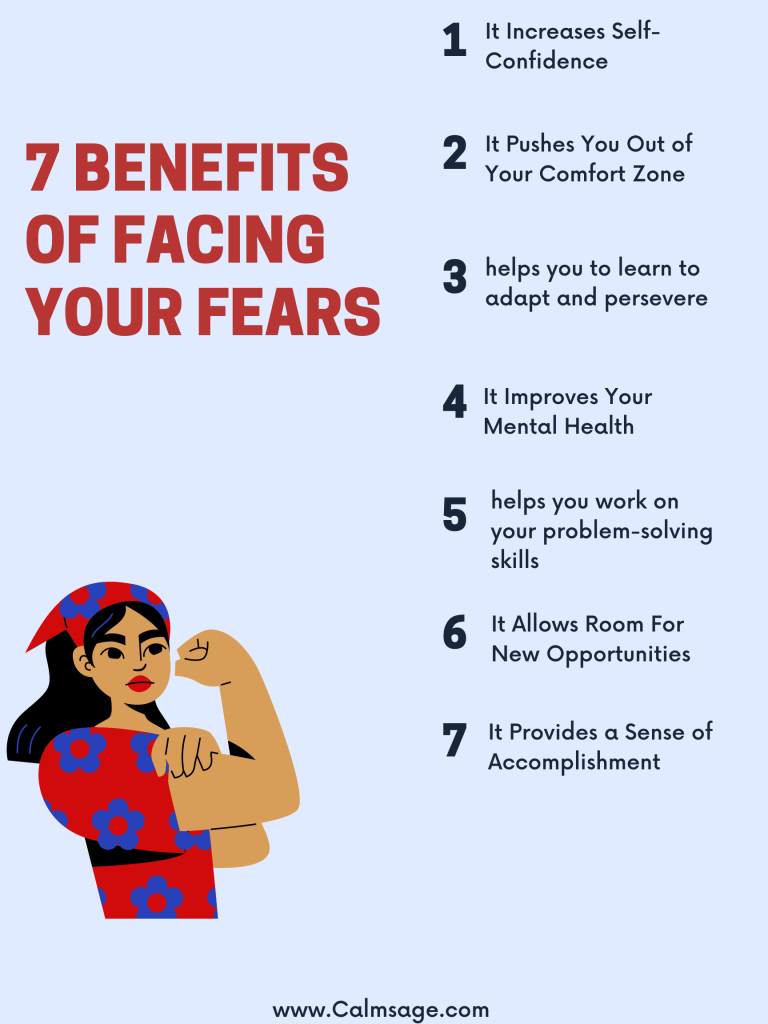Live Fearlessly: The Benefits of Facing Your Fears (With Tips)

I have a fear and so do we all. Fear is a powerful emotion that can grip us tight and hold us back from reaching our success and living life with vigor. Yet, fear isn’t something that we can avoid or ignore completely. I have my fears that I can’t ignore in my waking life. You must have your fears that you can’t escape, or seem to.
The prospect of facing your fears sounds daunting, but did you know that confronting your fears can be beneficial for your personal growth, confidence, and even self-esteem?
Yes, no matter how scary the idea of facing your fears might be, it can help you grow as a person, increase your confidence, and even bring a sense of accomplishment to your life.
So, let’s understand the psychology behind fear, explore the benefits of facing your fears, and learn tips on how you can take this brave step and confront your inner demons, gently.
The Psychology of Fear
Fear is a natural if not a primal response to threats that you may experience in your life. Fear triggers a series of physiological and psychological responses in your body, better known as the “flight-or-fight” response.
For example; You’re about to give a presentation to a huge audience. You might experience a racing heartbeat, sweaty palms, and a mind that’s full of negative thoughts. This is your body’s way of preparing to either face the challenge of public speaking or escape the situation. These physiological responses and psychological responses are hardwired into your brain as survival instincts.
Fears can also influence your thinking. When you’re afraid of something, you might experience tunnel vision aka a narrowed focus on the threat, reduced ability to make rational decisions, and a possibility of overestimating the danger the fear poses. Fear can often lead to feelings of anxiety, panic, being on edge, and even terror. The intensity of these feelings can depend on your experiences with said fear.
However, not all fears can be life-threatening. Many fears, such as the one in our example, public speaking, flying in an airplane, or fear of trying something new are not as dangerous as life-threatening ones. Understanding this contrast can help you better grasp the benefits of facing your fears.
The Benefits of Facing Your Fears
So, how does facing your fears benefit you? Let’s see;
1. It Increases Self-Confidence
Facing your fears can help you step away from your comfort zone and face challenges head-on. As you confront your inner demons, you move one step closer to your goals. Each win builds your self-esteem and belief in yourself. With time, this increased self-confidence can bring positive changes in your life.
2. It Pushes You Out of Your Comfort Zone
Your comfort zone offers you a sense of security, but staying there won’t always allow you to grow into the person you’re meant to be. Facing your fears means that you get to step out of your comfort zone. This personal growth journey can involve knowing yourself – your limits, your potential, etc. It can help you explore your skills, and strengths, and gain a better self-awareness.
3. It Develops Resilience
Resilience is the ability to bounce back from challenges. When you face your fears and experience setbacks, you learn to adapt and persevere. This resilience you build can become your strength, enabling you to cope better and more effectively with any challenges you might face in the future.
4. It Improves Your Mental Health
Anxiety and stress often come hand in hand with fear. When you confront your fears, you gradually reduce the anxiety-inducing triggers. This can help you better manage your well-being and provide an increased sense of control in your life. As you let go of your fears, you may find that your stress and anxiety also decrease, leading to a happier life.
5. It Helps Problem-Solving
Facing your fears requires problem-solving. It means coming up with solutions to overcome your fears and finding ways to manage the triggers. This process helps you work on your problem-solving skills and initiate innovative thinking. Building on these skills can help you become more equipped to deal with complex situations in the future.
6. It Allows Room For New Opportunities
Fear limits you from exploring new opportunities and experiences. When you face your fears head-on, you allow room for new possibilities you might have otherwise missed. Whether it’s a new job, a new hobby, a travel experience, or anything else you fear. These opportunities can bring novelty to your life and help you broaden your horizons.
7. It Provides a Sense of Accomplishment
The feeling of accomplishment that comes with facing your fears can be gratifying. This act of fighting against fear can provide a sense of accomplishment that can boost your self-worth and motivate you to tackle other hurdles in your way. This can also serve as a reminder of your resilience and the ability to overcome setbacks, making you believe in yourself once more.

Tips on How to Face Your Fears
So, now that you know the amazing benefits of facing your fears, here are some tips to help you confront your inner fears, but gently;
1. Start small: First, you need to begin with less intimidating fears if you want to let go of them. Starting with small fears can build your confidence gradually. Once you feel more confident in yourself, you can move on to bigger fears.
2. Visualize yourself succeeding: Mentally imagine yourself successfully facing your fears. Imagining a positive outcome before confronting your fears can help you feel confident in your abilities as well.
3. Seek help and support: You can also talk to your friends, family, or a therapist for tips and strategies to help you overcome your fears. With the right support and help, facing your fears can become easier.
4. Practice relaxation techniques: When you’re confronted with your fears, try to practice relaxation techniques such as deep breathing, meditation, and mindfulness. These techniques can help you stay in the present and manage anxiety before it takes hold of your fear response.
5. Set realistic goals: You can also set achievable and realistic goals to face your fears. Make sure to celebrate your progress and little wins as you move along the way. You can break your goals into smaller chunks too to make them more manageable.
6. Don’t give up: There will always be obstacles and setbacks along the way, but don’t give up. You need to stay consistent and work towards confronting your fears, one small step at a time.
Wrapping Up…
Facing your fears is not about becoming completely fearless, but it’s about developing the confidence and courage to face them and live fearlessly. By understanding the psychology of fear and its impact, you can explore the benefits of facing your fears – from increased self-confidence to better well-being.
All you need to do is be gentle with yourself, take small steps, and remember that you’re not alone and that facing your fears brings you one step closer to a more fulfilling life.
After all, Zig Ziglar once said, “Fear has two meanings: ‘Forget Everything And Run’ or ‘Face Everything And Rise.’ The choice is yours.“
I hope this article helped you understand the benefits of facing your fears and how you can do it. Let me know what you think about the article and the idea of facing your fears in the comments box below.
Take Care!




















